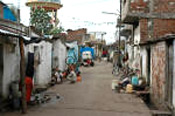|
|
Bhopal, India: Twenty-three Years after Union Carbide
In the early hours of 3 December 1984 forty tons of poisonous gas was accidentally released from the Union Carbide plant in Bhopal, India, in what has become one of the world’s worst industrial disasters. Three thousand people never awoke from their sleep and another fifteen to twenty-two thousand eventually succumbed to the poison they breathed. It is estimated that over half a million people suffered in this tragic event. And yet, justice is still elusive and the poor who have suffered the most have received little compensation while many lawyers and special interest groups have gained from this event.
Bhopal is the capital of India’s State of Madhya Pradesh. As lawmakers make their way to the modern Legislative Assembly, they see the slums which surround the city. For the politicians, power is about politics; it is not about the people. In spite of verbal promises from lawmakers to address poverty issues and from international development agencies promising financial assistance, progress is slow in bringing institutional changes that would benefit the poor.
Bhopal’s slums are typical of those seen around the world—communities of “homes” barely held together and with only the minimum of essential services such as water, sewage and electricity.
Bhopal’s slums are typical of those seen around the world—communities of “homes” barely held together and with only the minimum of essential services such as water, sewage and electricity. The skyline of the Bhopal slums has not changed significantly over the last seven years. While the population density has increased, there has been little additional encroachment on the few remaining available square fee. The growth of the slums has been mitigated due to some progressive policies to keep the rural population from migrating to the city. In the slums, religion is no barrier to poverty: Hindus, Muslims, Christians and others share it alike.
There are a number of NGOs (Non-governmental Organizations) doing what they can to bring hope and alleviate suffering in the slums. However, without changes to the local economic structure and government policy and without improved infrastructure, these NGO-sponsored programs are more like relief efforts than community development programs. In this type of environment, sustainable change is almost impossible. A basic supporting infrastructure of energy, communication, transportation, potable water, justice and government policies are essential in making a significant impact. Sadly, these are lacking.


